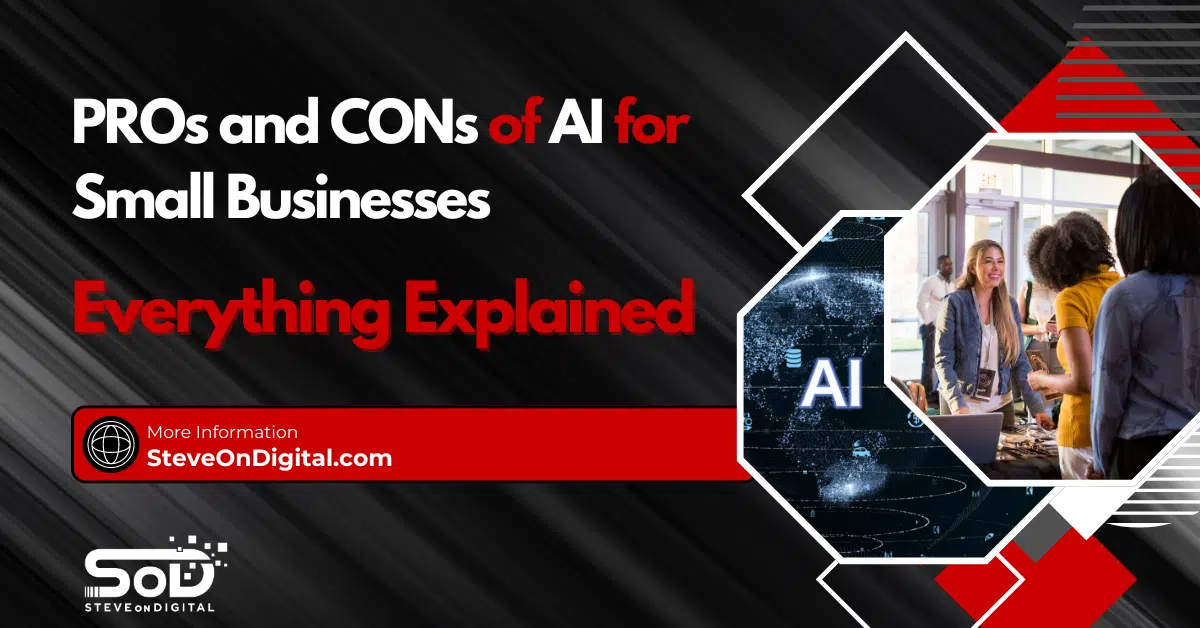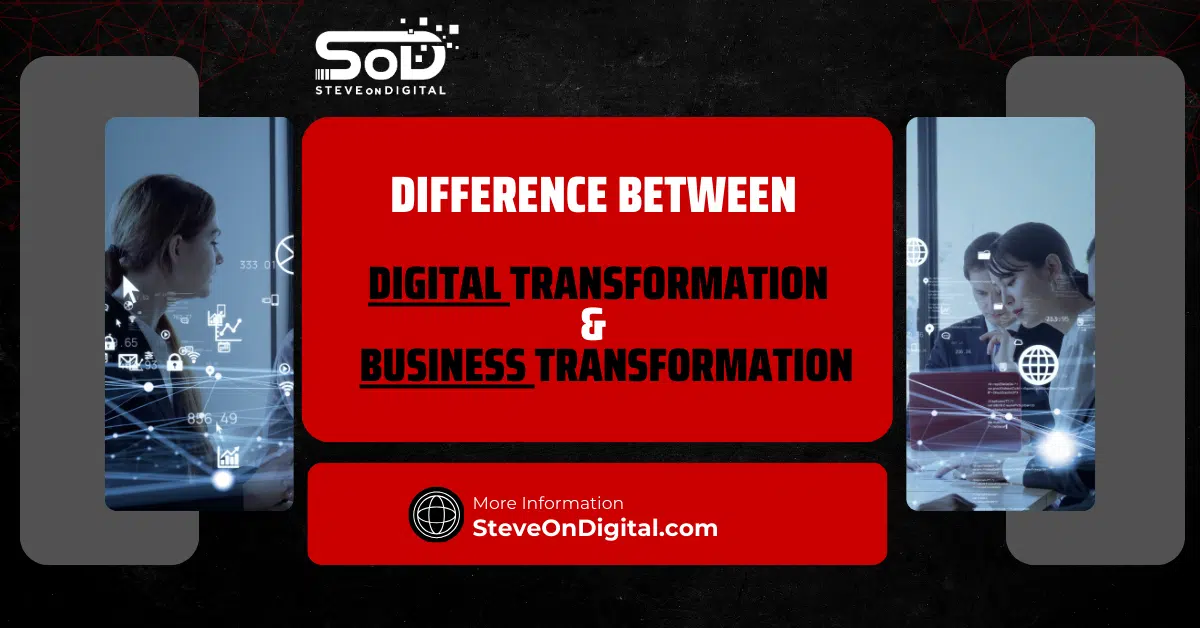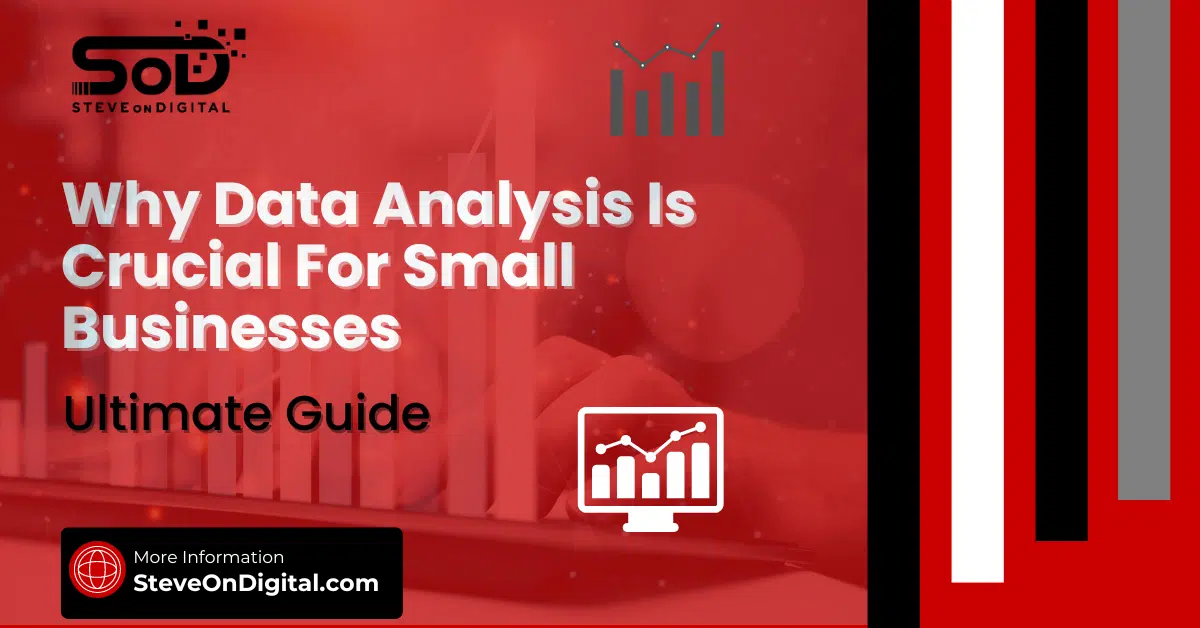Artificial Intelligence (AI) is changing how small businesses operate by improving efficiency and driving growth. From enhancing customer service with AI-powered chatbots to streamlining operations, AI tools are becoming essential for small business owners.
In this comprehensive article, I will explore the pros and cons of AI for small businesses. I’ll cover the benefits like increased efficiency and valuable insights, as well as challenges such as high initial costs and data security concerns. This guide aims to provide an all-encompassing view of AI, ensuring you have all the information needed to make informed decisions.
I’m Steve, a digital transformation expert with a strong background in electrical engineering, an MBA, and a master’s in Project Management. I excel at helping SMEs navigate the digital landscape with practical insights.
Understanding AI and Its Applications
What Is Artificial Intelligence?
Artificial Intelligence refers to computer systems that can perform tasks typically requiring human intelligence, such as visual perception, speech recognition, decision-making, and language translation. For small businesses, AI can automate repetitive tasks, analyze vast amounts of data, and provide actionable insights.
Key AI Technologies
Key AI technologies include machine learning, natural language processing (NLP), and computer vision. Machine learning enables systems to learn and improve from experience without being explicitly programmed. NLP allows computers to understand and respond to human language, while computer vision enables machines to interpret and process visual data from the world.
AI in Business Context
AI is applied in various business functions, including customer service through AI-powered chatbots, marketing automation, and data analysis. These technologies help businesses improve efficiency, make informed decisions, and enhance customer engagement.
Benefits of AI for Small Businesses
Increased Efficiency
AI excels at automating routine tasks, reducing the time and effort required to complete them. For example, businesses using AI report an 80% improvement in productivity (Vena). By automating repetitive tasks, small businesses can free up employees’ time for more strategic activities.
Enhanced Decision Making
AI tools analyze large datasets, offering insights that help in making well-informed decisions. For instance, 89% of employees believe AI supports them in up to half of their everyday work activities, enhancing their decision-making capabilities (BusinessDIT).
Improved Customer Experience
AI-powered chatbots and virtual assistants can handle customer inquiries efficiently, leading to improved customer satisfaction. One company reported a 30% growth in customer satisfaction after implementing AI tools (Vena).
| Benefit | Description | Example |
| Increased Efficiency | Automates routine tasks, freeing up employees for strategic activities. | Businesses report an 80% improvement in productivity using AI (Vena). |
| Enhanced Decision Making | Analyzes vast amounts of data to provide actionable insights. | 89% of employees believe AI supports them in decision-making (BusinessDIT). |
| Improved Customer Experience | Uses AI-powered chatbots and virtual assistants to handle inquiries efficiently. | A company saw a 30% growth in customer satisfaction after implementing AI tools (Vena). |
Challenges of Implementing AI
Initial Implementation Costs
Implementing AI technology in a small business can be a significant investment. The initial costs include purchasing AI software, hardware upgrades, and training employees. According to a report by PwC, the global AI market is expected to grow to $15.7 trillion by 2030, highlighting the substantial financial commitment required to keep up with technological advancements (ColorWhistle). Additionally, the cost of AI-powered tools and solutions can be prohibitive for small businesses operating on tight budgets. From my experience, it’s crucial to carefully plan and budget for these expenses to avoid financial strain.
Integration Challenges
Integrating AI into existing systems can be a daunting task. Many small businesses face challenges in aligning new AI technologies with their current infrastructure. This can lead to disruptions in business processes and require significant changes to existing workflows. According to Gartner, 37% of businesses employ AI, but less than 15% deploy AI capabilities effectively in their operations (DataProt). The complexity of integration often requires technical expertise that small businesses might not have in-house, necessitating additional costs for hiring external consultants or specialists.
Data Privacy Concerns
Data privacy is a significant concern when implementing AI technologies. AI systems often require access to vast amounts of data to function effectively. Ensuring the security and privacy of this data is paramount, especially with increasing regulations like GDPR. A survey by Blumberg Capital found that 52% of consumers doubt AI’s ability to protect their private information (https://www.authorityhacker.com). Small businesses need strong data security measures to protect sensitive information and maintain customer trust. Personally, I’ve found that establishing clear data privacy policies and practices is essential for mitigating these risks.
| Challenge | Description | Example |
| Initial Implementation Costs | High upfront costs for software, hardware, and training. | The global AI market is expected to grow to $15.7 trillion by 2030 (ColorWhistle). |
| Integration Challenges | Difficulty aligning new AI technologies with existing infrastructure. | 37% of businesses employ AI, but less than 15% deploy it effectively (DataProt). |
| Data Privacy Concerns | Ensuring the security and privacy of data processed by AI systems. | 52% of consumers doubt AI’s ability to protect their private information (Blumberg Capital). |
Ethical Considerations of AI
Job Displacement
AI’s ability to automate tasks can lead to job displacement, raising ethical concerns. According to the World Economic Forum, while AI will create 97 million new jobs by 2025, it will also eliminate 85 million jobs, resulting in a net decrease (ColorWhistle). This displacement can disproportionately affect lower-skilled workers who perform routine tasks that AI excels at automating. As a small business owner, it’s important to consider the impact on employees and explore opportunities for retraining and upskilling to help them transition to new roles.
Unfair or Discriminatory Outcomes
AI algorithms can sometimes produce biased or unfair outcomes if not properly managed. This can occur if the data used to train AI systems contains inherent biases. A Vena report found that 60% of businesses using AI do not address potential biases (Vena). It’s essential to ensure that AI systems are designed and monitored to prevent discriminatory outcomes. Implementing ethical AI practices, such as regularly auditing AI algorithms and using diverse training data, can help mitigate these risks.
Maintaining Human Touch
While AI can enhance efficiency and productivity, maintaining human interaction is crucial for certain aspects of business. Customers often value the personal touch that human employees provide. A survey by Blumberg Capital revealed that 28% of people believe the human touch is still needed to get the job done (https://www.authorityhacker.com). Balancing AI with human interaction can help preserve customer relationships and ensure a more personalized experience. In my business, I’ve found that combining AI tools with human oversight helps maintain this balance effectively.
Practical Applications of AI in Small Businesses
Automating Routine Tasks
AI can automate various routine tasks, freeing up employees to focus on more strategic activities. For instance, AI-powered tools can handle data entry, scheduling, and inventory management. According to SnapLogic, 56% of workers are already using AI in their daily tasks, leading to significant productivity gains (Juliety). In my experience, automating these tasks has allowed my team to focus on more value-added activities, ultimately enhancing our overall efficiency.
Enhancing Marketing Efforts
AI can significantly improve marketing strategies by analyzing customer data and providing insights for targeted campaigns. AI tools can identify patterns and trends, helping businesses optimize their marketing efforts. A study by Authority Hacker found that 26% of B2B marketers using AI chatbots saw a 10-20% increase in lead generation volumes (https://www.authorityhacker.com). By leveraging AI in marketing, small businesses can achieve more effective and personalized customer outreach.
Improving Decision Making
AI provides actionable insights by analyzing vast amounts of data, supporting better decision-making. AI-driven analytics can identify trends, forecast demand, and optimize business strategies. A report by Forbes highlighted that 64% of business owners expect a positive impact on productivity from AI (Juliety). Personally, using AI tools for data analysis has enabled me to make more informed decisions, resulting in improved business outcomes.
| Application | Description | Example |
|---|---|---|
| Automating Routine Tasks | AI can handle data entry, scheduling, and inventory management. | 56% of workers use AI for daily tasks, leading to productivity gains (Juliety). |
| Enhancing Marketing Efforts | AI analyzes customer data to optimize marketing campaigns. | 26% of B2B marketers using AI chatbots saw a 10-20% increase in lead generation (Authority Hacker). |
| Improving Decision Making | AI-driven analytics provide insights for strategic decisions. | 64% of business owners expect a positive impact on productivity from AI (Juliety). |
AI Tools for Small Businesses
Choosing the Right AI Tools
Selecting the right AI tools for your small business can be overwhelming, but it’s essential to find solutions that align with your specific needs. Start by identifying the areas of your business that can benefit most from AI, such as customer service, data analysis, or marketing efforts. Look for tools that integrate seamlessly with your existing systems to avoid significant disruption.
For example, AI-powered tools like HubSpot for marketing automation, Tableau for data analysis, and Zendesk for customer service are popular choices among small businesses. These tools are designed to be user-friendly and scalable, making them suitable for businesses of all sizes.
AI-Powered Chatbots
AI-powered chatbots are transforming customer service by providing instant responses to customer inquiries, reducing wait times, and improving overall customer satisfaction. A study by Salesforce found that 67% of consumers expect to use messaging apps to communicate with businesses, and chatbots can handle routine tasks efficiently (https://www.authorityhacker.com).
I have implemented chatbots on my website to manage common customer queries. This has not only improved response times but also freed up my team’s time to focus on more complex issues. AI-powered chatbots like Chatfuel and ManyChat are excellent options for small businesses looking to enhance their customer engagement.
Data Analysis Tools
AI tools that assist in analyzing vast amounts of data can provide valuable insights into your business operations, customer behavior, and market trends. These insights can help you make informed decisions and stay ahead of the competition.
Tools like Google Analytics, IBM Watson Analytics, and Microsoft Power BI are widely used for data analysis. They allow you to process and visualize data effectively, uncovering patterns and trends that can drive strategic decisions.
| Tool | Purpose | Example Features |
|---|---|---|
| HubSpot | Marketing Automation | Email marketing, social media management |
| Tableau | Data Analysis | Data visualization, real-time analytics |
| Zendesk | Customer Service | Ticketing system, customer support portal |
| Chatfuel | AI-Powered Chatbots | Customizable chatbots, integration with messaging apps |
| Google Analytics | Data Analysis | Website traffic analysis, user behavior tracking |
| IBM Watson Analytics | Data Analysis | Predictive analytics, natural language processing |
| Microsoft Power BI | Data Analysis | Business intelligence, interactive dashboards |
Pros of AI for Small Businesses
Competitive Advantage
AI provides a competitive edge by enabling small businesses to operate more efficiently and effectively. According to a report by PwC, AI is expected to contribute $15.7 trillion to the global economy by 2030, highlighting its potential to drive significant growth (ColorWhistle).
By leveraging AI, small businesses can compete with larger enterprises by automating processes, personalizing customer experiences, and making data-driven decisions. This can level the playing field and help small businesses thrive in competitive markets.
Enhancing Efficiency
AI excels at automating routine tasks, allowing employees to focus on more strategic activities. For example, AI can handle tasks like data entry, scheduling, and inventory management, significantly reducing the workload and increasing efficiency.
A study by SnapLogic found that 56% of workers are already using AI in their daily tasks, leading to substantial productivity gains (Juliety). In my business, automating these tasks has streamlined operations and improved overall efficiency.
Providing Valuable Insights
AI helps in extracting deeper insights from business data, enabling more informed decision-making. AI-driven analytics can identify trends, forecast demand, and optimize business strategies.
For instance, using AI tools for data analysis has enabled me to make more informed decisions, resulting in better business outcomes. AI can analyze vast amounts of data quickly and accurately, providing actionable insights that drive growth.
Cons of AI for Small Businesses
High Initial Costs
The financial burden of implementing AI technologies can be significant for small businesses. The initial costs include purchasing AI software, hardware upgrades, and training employees.
According to Gartner, 37% of businesses employ AI, but less than 15% deploy AI capabilities effectively due to the high costs involved (DataProt). Careful planning and budgeting are essential to manage these expenses and avoid financial strain.
Ongoing Maintenance
Maintaining AI systems requires ongoing efforts and costs. Regular updates, monitoring, and troubleshooting are necessary to ensure that AI tools function correctly and securely.
A report by Blumberg Capital highlighted that 52% of consumers doubt AI’s ability to protect their private information, emphasizing the need for robust data security measures (https://www.authorityhacker.com). Small businesses must invest in maintaining their AI systems to mitigate these risks.
Data Security Risks
Using AI involves processing large amounts of data, raising concerns about data security and privacy. Ensuring the security and privacy of this data is critical, especially with increasing regulations like GDPR.
Investing in strong data security measures and establishing clear data privacy policies are essential steps for small businesses to protect sensitive information and maintain customer trust.
Leveraging AI for Competitive Edge
AI in Various Industries
AI applications vary across different sectors, offering unique benefits to each industry. For example, AI in healthcare can improve patient outcomes through predictive analytics, while AI in retail can enhance customer experiences through personalized recommendations.
By understanding the specific applications of AI in your industry, you can leverage AI to gain a competitive edge. Small businesses can adopt AI technologies tailored to their industry’s needs, driving innovation and growth.
Embracing AI Technologies
Adopting AI is crucial for staying competitive in today’s market. AI-driven innovations can empower small businesses to make informed decisions, improve productivity, and enhance customer experiences.
In my experience, embracing AI has been a game-changer for my business. It has enabled me to operate more efficiently, make data-driven decisions, and provide better services to my customers. Encouraging small businesses to adopt AI can help them stay ahead in the market.
Case Studies
Real-life examples of small businesses successfully leveraging AI can provide valuable insights and inspiration. For instance, a small retail business using AI-powered chatbots saw a 20% increase in lead generation volumes (https://www.authorityhacker.com).
These case studies highlight the practical benefits of AI and demonstrate how small businesses can implement AI solutions effectively. Learning from these examples can help other small business owners make informed decisions about adopting AI.
Final Thoughts
AI offers significant opportunities for small businesses to enhance efficiency, improve decision-making, and gain a competitive edge. However, it also presents challenges such as high initial costs and data security risks. By understanding these pros and cons, small business owners can make informed decisions about adopting AI and leveraging its potential to drive growth.




